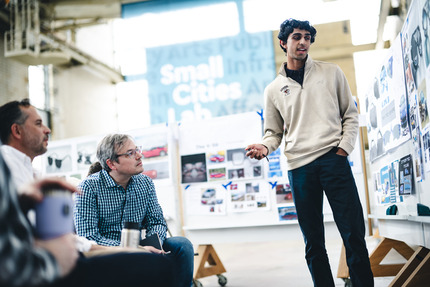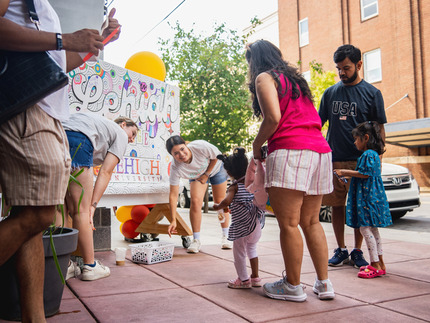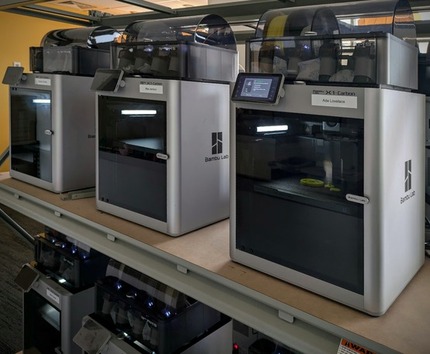Research

Our first two years of the Inspiring the Future Makers strategy have been dedicated to enhancing the research environment and investing in interdisciplinary research centers. These actions have contributed to strong growth in research activity over the past few years, Lehigh's sponsored research expenditures stayed steady in FY25 at $59M and several Lehigh faculty have received national honors for their research accomplishments.
Highlights include:
- Achieved Carnegie R1 Classification: This designation formally recognizes Lehigh as a top-tier research university, a direct outcome of our strategic investments and a testament to the growing scale of our research enterprise.
- Launched Two New University Research Centers: We established the Center for Advancing Community Electrification Solutions (ACES) and the Center for Community-Driven Assistive Technologies (CDAT), creating interdisciplinary hubs designed to generate high-impact, solution-oriented research.
- Elevated National Recognition: Lehigh faculty were recognized as national leaders in their fields, with Professor Dan M. Frangopol elected to the National Academy of Engineering (NAE) and Professor Hannah Dailey named a recipient of the prestigious Presidential Early Career Award for Scientists and Engineers (PECASE). These honors underscore the caliber of our faculty and their high-impact, globally visible research.
- Convened Statewide Workshop on Technology Transfer: We hosted a statewide symposium, in partnership with Pennsylvania’s Office of Transformation and Opportunity and the Pennsylvania Department of Community and Economic Development (DCED), solidifying Lehigh’s role as a leader in turning academic innovation into economic opportunity for the region.
- Built Foundational Support: We established a new Research Support Services office to streamline support and ensure a more efficient and effective research ecosystem.
- Assessed Internal Investments: We completed an initial review of internal research grants to determine how internal seed funding can best be used to generate a strong return on investment in supporting long term research success.
Education

To be a leader in student outcomes, we've focused on expanding interdisciplinary learning, fostering innovative pedagogy, and transforming graduate education. Our Year Two efforts have yielded significant progress, setting the stage for future growth and excellence.
Highlights include:
- Enhanced Interdisciplinary Learning: We launched the Explore Lehigh program, providing first-year students with a new, interdisciplinary first-semester curriculum.
- Piloted Innovative Educational Approaches: Our “Future Labs: Calculus II Math Lab” course integrates calculus theory and applications with hands-on design and collaborative problem-solving from day one. This approach is designed to help students succeed in a foundational course where they often struggle.
- Developing Faculty Teaching Innovators: We also hosted a First-Year Rossin Experience (FYRE) Boot Camp for senior Rossin faculty, a crucial step in preparing for the Fall 2025 launch of ENGR 095, a 3-credit pilot course that will serve as the core of the new model of first-year engineering education.
- Expanded Inter College Programs: We welcomed the inaugural student cohort into the new inter-college Integrated Business and Health program, a testament to our commitment to breaking down disciplinary silos to prepare students for the complexities of the modern workforce.
- Launched New Graduate Programs: In response to growing industry demand, we developed and launched a new Aerospace Engineering MS program, and through Future Maker Grants, we seeded the development of new master’s programs in AI, BioTech, and BioMed.
- Increased Graduate Enrollment: Our strategic focus on graduate education has already yielded results, with graduate first-year enrollment increasing by 25%.
- Innovating Doctoral Training: We convened the National Workshop on the Formation of Industry-University Partnerships for Doctoral Training, a national workshop with leaders from academia, industry, and government to develop new models for doctoral training and partnerships.
- Elevating Teaching Excellence: We launched a credentialed evidence-based Teaching Practices course for faculty and established OEIA Service Request Hub for soliciting and overseeing new interventions centered on educational innovation.
- Enhanced Student Outcomes: Increased focus on student retention resulted in an almost 1% increase in our first-year retention rate (now 94.3%), a key indicator of student satisfaction and academic success.
Community

At Lehigh, we believe that an authentic sense of belonging for our students, faculty and staff is critical to our success and that Lehigh's success is critical to how we contribute to the region. In Year Two, we made significant strides in this area by actively engaging with both our on-campus and Lehigh Valley communities to ensure Lehigh is a place where people and partnerships can thrive.
Highlights include:
- Demonstrated Our Regional Impact: Our newly developed and published Community and Economic Impact Report quantified our annual contribution to the Lehigh Valley at $1.4 billion, reinforcing our role as a key economic engine for the region.
- Expanded Our Community Collaborations: We established a formal partnership with Good Shepherd Rehabilitation, advancing the university’s commitment to health-focused collaboration, research and education. Small Cities Lab partnered with the community to envision the future of often-overlooked small cities, driving new solutions in collaboration with other communities. We also increased our active membership on key local boards, driving greater collaboration and shared success.
- Deepened Community Engagement: We increased community awareness and attendance at popular events on campus, like Compelling Perspectives and Cirque Kickasse, and expanded Lehigh’s footprint in community events, like Musikfest through Start Up Lehigh Valley and the Lehigh Lounge, providing more shared experiences for the campus and local communities.
- Received National Recognition: For the sixth consecutive year, Lehigh received the HEED Award and, for the first time, we were named a HEED Champion, a clear testament to our commitment to diversity, equity, and inclusion.
- Engaged Lehigh Community in Developing Brand Platform: Over the past year, we engaged the entire Lehigh community—from students and faculty to staff and alumni—as well as our external audiences to develop a refreshed brand strategy and visual identity. This collaborative effort ensures our new public-facing brand, which launches this fall, reflects our shared values and positions Lehigh for success in communicating those values to the world.
- Strengthened Community Trust and Perception: Year-two results of a Lehigh Valley resident survey demonstrated that our community engagement efforts are succeeding, with a positive increase in favorable responses regarding trust, community impact and willingness to recommend Lehigh to family and friends. Notably, there was a 14-point improvement over last year in how likely respondents are to recommend Lehigh, surpassing the benchmark for higher education.
Infrastructure

Our strategic vision for the future of Lehigh is built on a foundation of cutting-edge infrastructure. In Year Two, we made significant strides in both our physical and technological environments to create a campus that is more connected, efficient, and forward-looking.
Highlights include:
- Unveiled Making the Future: A Plan for the Lehigh Campus: This comprehensive, 30-year framework aligns our physical spaces with our strategic vision. It was developed with broad input from the Lehigh community, ensuring it supports student success, fuels groundbreaking research, and strengthens our ties to the Lehigh Valley.
- Continued Activation of Mountaintop: We successfully increased engagement on Mountaintop, hosting more than 50 community-focused events, teaching 25% more courses there, and launching a new website to promote its vibrant offerings. We also planned the relocation of the Research Translation AcceLUrator and Center for Catastrophe Modeling and Resilience to Mountaintop in Fall 2025, solidifying its role as a hub for innovation and research.
- Modernized Key Campus Spaces: We opened the renovated Clayton University Center to the community ahead of schedule and launched a new 3D printing hub on Mountaintop, both of which expand the resources and community spaces available to our students and faculty.
- Upgraded Core Campus Technology: We successfully migrated the campus to a unified communications platform, Zoom Workplace, and launched the RAPTOR (Resource Allocation Planning Tool for Operational Reporting) resource planning system, enhancing operational efficiency across the university. We also completed the first year of the “Banner SaaS Transition: Driving Innovation for a Future-Ready Lehigh” project to enhance, improve, and modernize our Ellucian Banner Enterprise Resource Planning (ERP) and Student Information System (SIS) as well as the many systems that are integrated with Banner.
- Invested in Operational Efficiencies: To ensure our work is data-informed and future-ready, we made our Data Lake available to initial users, hosted an AI@Lehigh Summit, and launched a process to improve efficiency and identify savings that resulted in approximately $500k of savings. The campus community continues to be engaged with this process, evidenced by the increased utilization of our Opportunities for Improvement Process.
